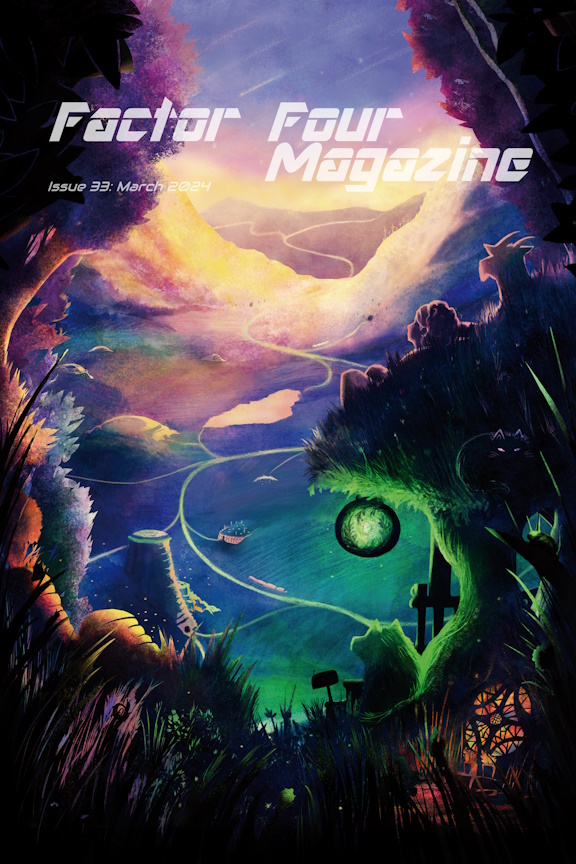Evilla, Mistress of Pestilence, Queen of Consumption, Bringer of Death Must Regretfully Decline Your Invitation to Be Another Tortured Antihero By Garrett Croker
Evilla, Mistress of Pestilence, Queen of Consumption, Bringer of Death Must Regretfully Decline Your Invitation to Be Another Tortured Antihero
By Garrett Croker
Evilla the Mistress of Pestilence squirmed as her backstory began to fill in. For so long, she’d reveled in her fairy tale role as the harbinger of death without once needing her details hashed out to do it. In her most famous adaptation, a nobleman “forgot” to invite her to his wedding. In the spirit of equanimity, she placed a pox on his entire line. Once, a peasant woman failed to honor her according to the appropriate and intentionally confounding rituals demanded by her order: That woman died of tuberculosis. In an oddly modernized retelling somebody had the audacity to cut her off in traffic. Sorry, Ron from Marketing. You’ve got the clap now.
Of course, nothing lasts forever, and some studio bigwig had gone and hired a hotshot twenty something with less imagination than he had experience to write a movie.
An origin story.
The bastards.
She’d had a pretty good run, but nobody would find her scary after this. No, they would sympathize with her. Deep down Evilla wished the fear of her could have died in the toy aisle like so many good villains before her. She would have made a great plushy. And if it meant she was too cute to fear, at least she would have her dignity.
She squirmed again as another piece fell into place.
Evilla had never been a child before. She sprang fully formed one day into the center of an afternoon tea that had run interminably into high tea. None of those in attendance knew the taste of tea ever again.
But as the writer drafted she began to remember. When she was five, she liked to pick flowers. Mommy took the flowers little Avilla — with an A! — brought home, dried their petals, and boiled them to make her tea. She liked to say that her Avilla’s tea was the reason she was so healthy all the time. That is, until the day little Avilla brought home the wrong flowers…
It was too painful to remember. For the first time in her existence, Avilla was crying. Apparently, backstory hurt.
She was being hurt.
This was, it turned out, less fun than when she was the one doing the hurting.
She grew up in the space of a montage. Wherever she went, disease and death followed. She did nothing to court it but it was there, and people noticed. The nickname Evilla was borne, neighbors gossiping in tones hushed only enough that she could still hear them. If Avilla could do the things they accused her of, they never would have dared.
One day she met a boy, and the young hotshot writer couldn’t decide what happened next. He left to work on another project for a few days while his subconscious worked the problem out.
And thank God for that! Not that Avilla — Evilla! — believed in Him. Monotheism, of all things. If Evilla did believe in gods, she would count herself among them. But the writer had not been very careful about maintaining a consistent point of view, and more and more these nominally Christian utterances kept needling their ways into her speech.
The boy was another problem. The writer really had never read her original stories if he thought she would ever fall for a male. Jesus, this was getting out of hand.
Evilla could already see where this was headed. If a boy was involved, there were only so many cliched plots the writer had available to choose from, and there was no way she was going to put up with any of them. She would not, for instance, cry herself silly about the overly on-the-nose death of her so-called first love. Or would the writer choose to make her a spurned lover, turned toward the darkness by petty rage?
But this was the age of gritty origin stories, and Evilla knew the tropes that creatively bankrupt Hollywood screenwriters leaned into these days.
Absolutely not.
This backstory had hurt her more than enough already. She was proud. She was terrifying. She was glorious. What good was backstory if all it did was make you miserable, make your motivations petty and small? Wasn’t it enough of a reason to bring evil death to the world that it was fun and that it made her happy?
Evilla decided to work on her own story.
She wouldn’t lose everything. The dead mother was quite good, actually. Evilla liked dead mothers. They were one of her favorite things. And if it made the audience sympathize with her a little, well, she could use that. Sympathy was a powerful tool to wield in the pursuit of terror. However, in Evilla’s version, the death of her mother led her to the study of botany where she learned all about the poisons that flowers carried, and from there to chemistry where she learned about all the poisons they did not.
And in the course of her studies she met a girl, for God’s sake. They had a lot of excellent sex and parted on ironically healthy terms.
This was good.
It wasn’t enough.
The writer was going to return and his ability to influence the story was greater and more immediate than her own. As long as the writer was in the picture, Evilla would end up with a boy, and he would do something terrible to her, and nobody would see her as anything but broken ever again. Because the writer was just that sick.
They should have just turned her into a plushy.
Maybe it didn’t have to be this way, though. If the writer could so easily affect the content of her story, maybe with effort she could do the same to his.
Evilla hesitated.
Because he was just that sick, she had thought.
And just like that, she knew the answer. Storytelling was not her particular talent, after all. She existed to do one thing and she was good at it.
Evilla focused.
He was sick, she thought.
She laughed.
He was sick. The next scene was never going to be written.





